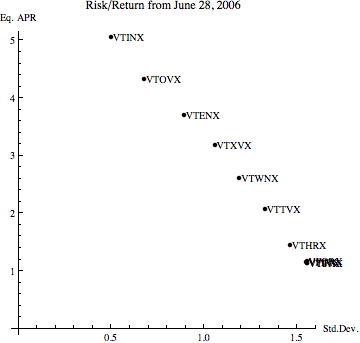I am a huge fan, but also am hesitant to use too much of one fund. We have approximatley 60% spread between Wellesley and Wellington in IRA and Balanced Index in Roths. Use these along with Total International to achieve our 40% stock target.
Wellington management has excelled over time with several different particular managers.
Here is a graph comparing Wellesley with 500 and Total Bond indices over time.
VWINX: Vanguard Wellesley Income Fund Chart | Morningstar
ps - Sorry, couldn't get 500 and total bond to save for link, but you can add and change funds for comparison.
Wellington management has excelled over time with several different particular managers.
Here is a graph comparing Wellesley with 500 and Total Bond indices over time.
VWINX: Vanguard Wellesley Income Fund Chart | Morningstar
ps - Sorry, couldn't get 500 and total bond to save for link, but you can add and change funds for comparison.




